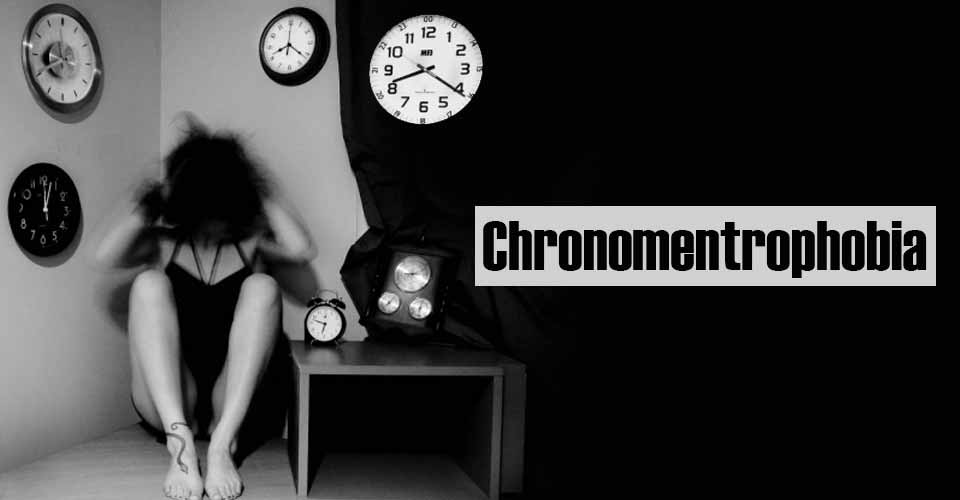Chronomentrophobia is characterized by an uncommon and intense irrational fear of clocks, watches, or timepieces. This phobia is closely connected to Chronophobia, the fear of time itself, and can lead to significant levels of anxiety and even panic in affected individuals.
What Is Chronomentrophobia?
Chronomentrophobia is colloquially or informally 1 Naguy, A., Moodliar-Rensburg, S., & Alamiri, B. (2020). Coronaphobia and chronophobia – A psychiatric perspective. Asian journal of psychiatry, 51, 102050. https://doi.org/10.1016/j.ajp.2020.102050 to describe an irrational anxiety related to time or a fear of clocks and watches. The term is derived from the Greek word chronos meaning “time,” the Latin word ment meaning “that of,” and the word phobos meaning “fear” in Greek mythology. However, it is important to note that while such usage may exist in casual conversation, it does not have an established or recognized place in the field of psychology.
There is no official definition or established concept associated with the symptoms of chronomentrophobia in reputable sources such as the Diagnostic and Statistical Manual of Mental Disorders (DSM-5) 2 Vahia V. N. (2013). Diagnostic and statistical manual of mental disorders 5: A quick glance. Indian journal of psychiatry, 55(3), 220–223. https://doi.org/10.4103/0019-5545.117131 or the International Classification of Diseases (ICD-10) 3 Steindel S. J. (2010). International classification of diseases, 10th edition, clinical modification and procedure coding system: descriptive overview of the next generation HIPAA code sets. Journal of the American Medical Informatics Association : JAMIA, 17(3), 274–282. https://doi.org/10.1136/jamia.2009.001230 . Because of this, there is no clinical data available to determine the prevalence of this condition.
Symptoms Of Chronomentrophobia
The common chronomentrophobia symptoms 4 Jefferson J. W. (2001). Social Anxiety Disorder: More Than Just a Little Shyness. Primary care companion to the Journal of clinical psychiatry, 3(1), 4–9. https://doi.org/10.4088/pcc.v03n0102 include:
- Irrational fear or anxiety related to time
- Irrational fear of clocks and watches.
- Excessive worry about deadlines and schedules.
- Avoidance of time-related activities or discussions.
- Physical symptoms such as sweating or increased heart rate in time-sensitive situations (like project deadlines, medical emergencies, legal proceedings, etc.).
- Difficulty functioning in daily life due to time-related fears.
Read More About Anxiety Here
Causes Of Chronomentrophobia
The common causes of chronomentrophobia, though not well-documented due to its informal nature, may include:
- A fear or concern 5 Loken, E. K., Hettema, J. M., Aggen, S. H., & Kendler, K. S. (2014). The structure of genetic and environmental risk factors for fears and phobias. Psychological medicine, 44(11), 2375–2384. https://doi.org/10.1017/S0033291713003012 related to time that is passed down generations.
- Traumatic experiences 6 Kuo, J. R., Goldin, P. R., Werner, K., Heimberg, R. G., & Gross, J. J. (2011). Childhood trauma and current psychological functioning in adults with social anxiety disorder. Journal of anxiety disorders, 25(4), 467–473. https://doi.org/10.1016/j.janxdis.2010.11.011 related to time, such as missing important deadlines or appointments.
- Childhood experiences of pressure or punishment regarding time management.
- Underlying anxiety or stress disorders 7 Bhui, K., Dinos, S., Galant-Miecznikowska, M., de Jongh, B., & Stansfeld, S. (2016). Perceptions of work stress causes and effective interventions in employees working in public, private and non-governmental organisations: a qualitative study. BJPsych bulletin, 40(6), 318–325. https://doi.org/10.1192/pb.bp.115.050823 that exacerbate time-related fears.
- Learned behavior from observing others’ anxieties about time.
- Personality traits that predispose individuals to perfectionism or excessive worry about time.
Symptoms Of Chronomentrophobia And Mental Health
Chronomentrophobia symptoms may be associated with various mental health conditions 8 Yoo, J. Y., & Lee, J. H. (2015). The effects of valence and arousal on time perception in individuals with social anxiety. Frontiers in psychology, 6, 1208. https://doi.org/10.3389/fpsyg.2015.01208 , including:
- Generalized anxiety disorder (GAD): Excessive worry and anxiety about time-related events and deadlines can be a feature of GAD.
- Panic disorder: Fear of time running out or being unable to meet deadlines can trigger panic attacks in individuals with panic disorder.
- Obsessive-compulsive disorder (OCD): Time-related obsessions and compulsions, such as checking the clock repeatedly, may overlap with OCD symptoms.
- Social anxiety disorder: Fear of being judged for arriving late or missing appointments can be linked to social anxiety and depression.
- Specific phobias: Chronomentrophobia symptoms may resemble specific phobias, such as the fear of schedules or punctuality.
Read More About Obsessive-Compulsive Disorder(OCD) Here
Chronomentrophobia Diagnosis
There is no official chronomentrophobia diagnosis in recognized mental health manuals like the DSM-5 or ICD-10 9 Substance Abuse and Mental Health Services Administration. (2016, June). Table 3.11, DSM-IV to DSM-5 Specific Phobia Comparison. Nih.gov; Substance Abuse and Mental Health Services Administration (US). Available from: https://www.ncbi.nlm.nih.gov/books/NBK519704/table/ch3.t11/ , as it is not a formally recognized psychological disorder. Instead, individuals experiencing symptoms of chronomentrophobia (including time-related anxiety, phobia, or fear of clocks and watches) should consult with a mental health professional who can assess their specific concerns, provide a proper diagnosis if applicable, and develop an appropriate treatment plan. Chronomentrophobia diagnosis and treatment would typically be based on related anxiety disorders or phobias that may be contributing to the symptoms.
Chronomentrophobia Treatment
The available chronomentrophobia treatment options include various therapeutic approaches and, in some cases, medications:
- Exposure therapy: This widely used approach 10 Sars, D., & van Minnen, A. (2015). On the use of exposure therapy in the treatment of anxiety disorders: a survey among cognitive behavioural therapists in the Netherlands. BMC psychology, 3(1), 26. https://doi.org/10.1186/s40359-015-0083-2 involves gradually exposing individuals to the feared stimulus, such as clocks, to desensitize them and reduce their fear.
- Cognitive behavioral therapy (CBT): CBT 11 Institute for Quality and Efficiency in Health Care. (2016). Cognitive behavioral therapy. Nih.gov; Institute for Quality and Efficiency in Health Care (IQWiG). Available from: https://www.ncbi.nlm.nih.gov/books/NBK279297/ helps individuals identify and modify negative thought patterns that contribute to their phobia.
- Mindfulness-based stress reduction therapy: This therapy incorporates mindfulness meditation techniques to teach coping skills for managing anxiety and phobias, helping individuals gain better control over their symptoms.
- Dialectical behavior therapy (DBT): DBT can aid in emotion regulation and stress reduction by utilizing techniques like the half-smile 12 Ma, K., Sellaro, R., Lippelt, D. P., & Hommel, B. (2016). Mood migration: How enfacing a smile makes you happier. Cognition, 151, 52–62. https://doi.org/10.1016/j.cognition.2016.02.018 , which encourages relaxation and improved emotional control.
- Medications: While there are no specific medications designed to treat phobias directly, certain drugs like anti-anxiety drugs or antidepressants 13 Guaiana, G., Barbui, C., Caldwell, D. M., Davies, S. J. C., Furukawa, T. A., Imai, H., Koesters, M., Tajika, A., Bighelli, I., Pompoli, A., & Cipriani, A. (2017). Antidepressants, benzodiazepines and azapirones for panic disorder in adults: a network meta‐analysis. The Cochrane Database of Systematic Reviews, 2017(7), CD012729. https://doi.org/10.1002/14651858.CD012729 can help manage the symptoms of chronomentrophobia.
Read More About Cognitive Behavioral Therapy Here
How To Overcome Chronomentrophobia
Along with seeking professional help, certain self-help strategies 14 Thng, C. E. W., Lim-Ashworth, N. S. J., Poh, B. Z. Q., & Lim, C. G. (2020). Recent developments in the intervention of specific phobia among adults: a rapid review. F1000Research, 9, F1000 Faculty Rev-195. https://doi.org/10.12688/f1000research.20082.1 can also help you overcome chronomentrophobia:
- Engaging in physical activity has been shown to be quite effective in coping with anxiety disorders.
- Joining a support group can help you share and learn from others who are suffering from the same or similar conditions.
- Practicing yoga has also been proven to be beneficial for combating stress related to phobias.
- Availing time-management apps, checklists, reminders, etc. to overcome a fear of clocks and watches.
- Having a gradual exposure to one’s fear of clocks and taking small and punctual steps to address chronomentrophobia.
Takeaway
Although most people don’t seek chronomentrophobia treatment, getting professional help can enable someone to overcome their fear, work with deadlines and live a healthy life around the clock. However, it is also important that people with symptoms of chronomentrophobia look inside and understand the deep rooted cause of their fear of clocks and watches. Once you understand the necessary chronomentrophobia facts, you will be better able to manage your phobia and deal with your condition before it gets more severe.
At A Glance
- Chronomentrophobia is an unusual, irrational and intense fear of timepieces, clocks, and watches.
- This irrational fear of clocks and watches can lead to high levels of anxiety and stress in the sufferer and panic attacks.
- The causes of chronomentrophobia can be related to schedules, promptness, punctuality, trauma, etc.
- This fear of clocks and watches is a different condition separate from the phobia of passing time.
- People with the symptoms of chronomentrophobia often believe that their lives are controlled by clocks and time.
- Clock watchers can also develop this phobia.
- Chronomentrophobia treatment methods like therapy and medication can greatly improve the symptoms associated with this condition.
Frequently Asked Questions (FAQs)
1. How do people develop chronomentrophobia?
People may develop chronomentrophobia through traumatic experiences, learned behavior, or underlying anxiety disorders related to time or clocks.
2. Does chronomentrophobia go away?
The persistence and duration of chronomentrophobia can vary among individuals, but individuals can overcome chronomentrophobia with therapy and other interventions.
3. How do you know if you have chronomentrophobia?
You may suspect you have chronomentrophobia if you experience intense and irrational anxiety or fear when encountering clocks, watches, or time-related situations.
4. How is chronomentrophobia related to chronophobia?
Chronomentrophobia is related to Chronophobia as it involves an intense fear of clocks or time-related objects, while Chronophobia is a broader fear of time itself.














